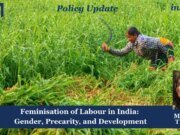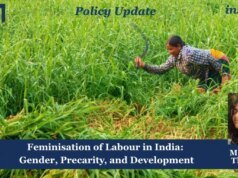Press Release
Geetam Acharya
The IMPRI Center for the Study of Finance and Economics (CSFE) IMPRI Impact and Policy Research Institute, New Delhi, hosted an interactive panel discussion on the topic Viksit Bharat – Developed India @2047 and Union Budget 2024-25. On 24th July 2024, under the IMPRI 5th Annual Series of Thematic Deliberations and Analysis of Union Budget 2024-25, as part of IMPRI #WebPolicy Talk.
The budget panel discussion was chaired by Professor Nilanjan Basik, Professor and Program Director of BA Economics and Finance at Mahindra University. To start, Prof. Nilanjan Basik provided an overview of the budget, highlighting India’s Growth trajectory, fiscal health, and the challenges of income inequality. He discussed the Indian economy’s significant growth outperforming other large economies with a GDP growth rate exceeding 7% over the last three years. The management of India’s fiscal deficit, currently at 5.1%, has been crucial in controlling inflation compared to higher rates in other major economies like the US and Europe.
However, Prof. Banik lamented concerns about income inequality and job creation and highlighted the need for targeted interventions.
Additionally, he puts his focus on the current job market highlighting the prevalence of low- paying jobs in sectors like delivery and healthcare. Prof. Banik argued that the government is implementing various initiatives, including the production-linked incentive scheme, to enhance productivity and competitiveness in the manufacturing sector. These efforts aim to create more sustainable jobs.
Dr SP Sharma, Chief Economist & Deputy Secretary General, PHD Chamber of Commerce and Industry (PHDCCI) put his focus on the four key pillars to enhance the economy, aiming for significant improvements by 2047. These pillars include employment opportunities, support for MSMEs, and tax benefits for the middle class. He lamented that The budget emphasizes creating employment opportunities and connecting universities with industries to enhance skills among the young population. This initiative aims to boost workforce readiness and economic growth.
There are notable reforms in tax structures, including increased tax exemptions for lower income groups and rationalization of long-term capital gains tax. These changes aim to enhance disposable income for the middle class. He Highlights Support for the agriculture sector is highlighted, with potential for export growth from $30 billion to $100 billion within a few years. This reflects a strategic focus on boosting agricultural resilience and economic contributions.
Ms. Yuvika Singhal, Economist. Quanteco Research: Former Economist, Yes Bank & ICICI Bank, was the next panelist and argued that India is on a transformative path to become a developed economy by 2047, aiming for a $30 trillion economy while also increasing per capita GDP significantly. This trajectory, supported by recent economic reforms, shows promising growth potential despite ongoing challenges. She acknowledged that The Indian economy has seen remarkable growth recently, transitioning from being classified as one of the fragile five economies to the fifth largest globally.
Key reforms, including the introduction of IBC and GST, have played a vital role in enhancing India’s macroeconomic stability and promoting strong financial inclusion across the nation. These measures are crucial for sustaining economic growth, she argued. However, she critiqued that the economic recovery has been uneven, with higher-income groups thriving while middle and lower-income classes face stagnation and deterioration. This disparity highlights the need for balanced economic policies.
Prof Pooja Misra, Professor of Economics, Area Chair-Economics & IB. Birla Institute of Management Technology (BIMTECH), Noida, highlights the significant gap between the market share of global tech giants and the performance of Indian manufacturing sectors. Despite India’s economy being valued at around $4 trillion, major corporations dominate with market shares exceeding $10 trillion. It was noted that Indian corporations struggle to compete with tech giants like Microsoft and Nvidia, which dominate the market. The conversation shifted to the challenges of moving from a middle-income to a high-income economy, emphasizing the need for effective government policies. This transition is crucial for avoiding the middle-income trap many countries face.
Mr Saugata Bhattacharya, Former Chief Economist, at Axis Bank, was the next panelist He argued that the focus of economic reforms has shifted from large-scale initiatives to the detailed implementation of existing structural reforms. This change is essential for effective governance and competition with other nations. There is a renewed focus on rebalancing economic activity, especially in eastern states that lag in income growth. This political imperative aims to enhance overall economic equity. Lastly, he lamented that continuing fiscal discipline is a priority, with efforts to lower the fiscal deficit and stabilize state-level finances. Maintaining this discipline is crucial for future credit rating upgrades.
The last Panelist. Dr. Rajesh Shukla, Managing Director and CEO, People Research on India’s Consumer Economy (PRICE) ICE360, Indian Institute of Management Udaipur, Acknowledged that the economy is experiencing a gradual recovery, but income inequality remains a significant issue despite some positive trends. Income inequality rose sharply during the COVID-19 pandemic but has since decreased slightly in 2023, highlighting ongoing challenges in equitable distribution.
He argued that there is a critical need for better coordination between industries and educational institutions to address the mismatch in required manpower and existing human resources. The discussion, also, highlights the importance of generating data and insights rather than merely criticizing the current system. It emphasizes that constructive engagement is crucial for effective governance and development.
In sum. The discussion focused on India’s economic growth and the Union Budget for 2024-25, emphasizing the goal of achieving “Viksit Bharat” by 2047. While India has shown strong macroeconomic growth with GDP rates above 7%, concerns about income inequality, job quality, and the need for effective implementation of policies were highlighted. The budget reflects a commitment to fiscal prudence, avoiding excessive handouts, and promoting equitable growth across states. Additionally, the importance of aligning education with industry needs and enhancing private sector investment through employment-linked incentive schemes was emphasized as crucial for sustainable development.
IMPRI’s 5th Annual Series of Thematic Deliberations and Analysis of Union Budget 2024-25
IMPRI’s 5th Annual Series of Thematic Deliberations and Analysis of Union Budget 2024-25
Watch the event at IMPRI #Web Policy Talk
Viksit Bharat – Developed India @2047 and Union Budget 2024-25
Acknowledgement- This article was written by Geetam Acharya, a Research Intern at IMPRI and an undergraduate student at Sri Venkateswara College, University of Delhi with a keen interest in Political Science and International Relations.,



















